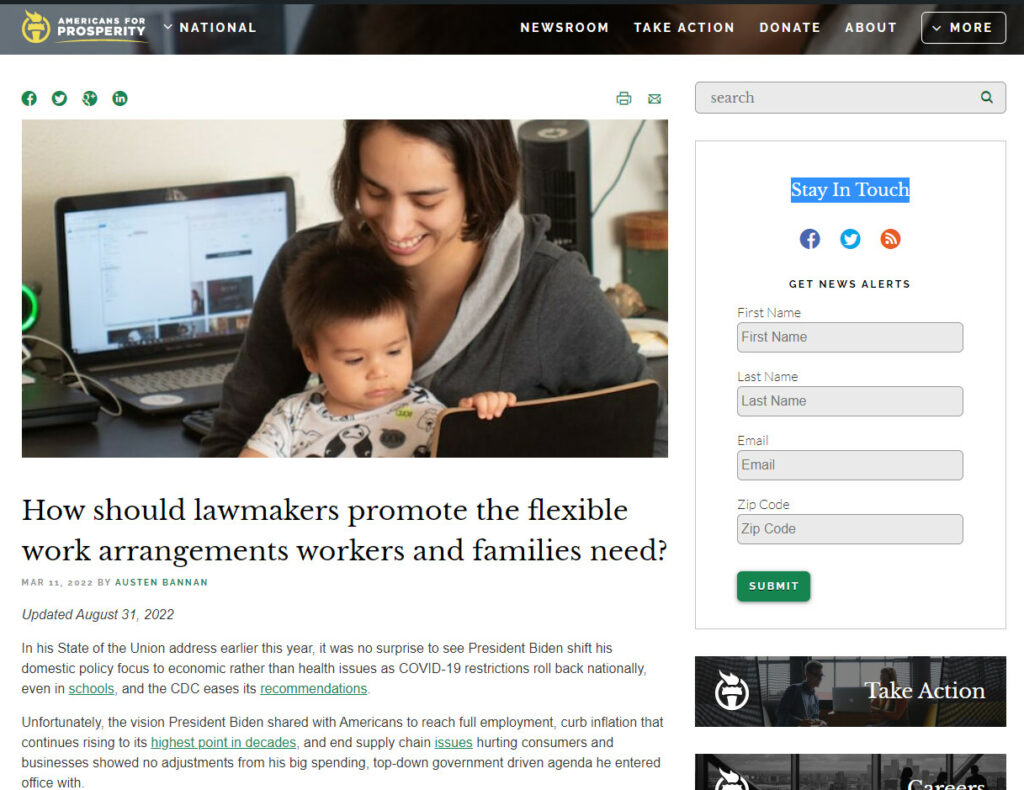
How will the Save Local Business Act help small businesses?
The Save Local Business Act would preserve key American engines of economic and employment growth. Here’s how.
Updated July 5, 2023
As a part of AFP’s broad agenda supporting a flexible workforce and contained within the AFP endorsed Employee Rights Act, the Save Local Business Act would help ensure continued paths to success for many entrepreneurs and small businesses across America.
What is the Save Local Business Act?
Included within the newly introduced ERA, the Save Local Business Act has also been introduced independently in the 118th Congress by U.S. Senator Roger Marshall (S. 1261) and U.S. Representative James Comer (HR 2826). This legislation would put into law a permanent “joint employer” standard that protects rather than undermines small and local businesses using franchise and vendor models through which entrepreneurs employ millions of Americans.
The standard would apply to both the U.S. Department of Labor (USDOL) enforcing the Fair Labor Standards Act (FLSA) and the National Labor Relations Board (NLRB) enforcing the National Labor Relations Act (NLRA).
The key provision in the ERA pertaining to this clarifies that:
“An employer may be considered a joint employer of the employees of another employer only if each employer directly, actually, and immediately, exercises significant control over the essential terms and conditions of employment of the employees of the other employer, such as hiring such employees, discharging such employees, determining the rate of pay and benefits of such employees, supervising such employees on a day-to-day basis, assigning such employees a work schedule, position, or task, or disciplining such employees.”
What does this mean?
Spoken more plainly, many small businesses are formed by entrepreneurs under franchise models — think of local McDonald’s and Great Clips stores, for instance — or vendor and subtractor models where businesses utilize other businesses and individuals to supply products or services such as manufacturers, temp agencies, construction companies, and cleaning companies.
Franchisees open their own businesses and staff their own employees but utilize branding, products, promotional material and/or other beneficial products and services from franchisors to build their business while vendor companies provide services to other businesses, meeting the end product expectations of those businesses but managing themselves independently.
Joint employer rules are used to determine if more than one business has control over employees such that both act as employers and are legally liable for the actions of each other.
The Save Local Business Act is important because it prevents entrepreneurs who wish to run independent businesses from falling under control of larger businesses, effectively ending their own businesses and turning someone in their position into merely a manager for other companies.
Policy Background for the Save Local Business Act
The Save Local Business Act is critical because the joint employer standard has been shifting based on current presidential administrations.
For instance, the Obama-era NLRB in 2015 issued a ruling in the Browning-Ferris Industries of California case that “indirect” control, and even reserving the right to control aspects without exercising them, was sufficient to deem a business a joint employer of employees that technically work for another business, such as a franchisees or vendors.
This standard jeopardized the livelihoods of many businesses and millions of workers but was overruled by the NLRB in 2017 under the Trump administration, which reinstated a pre-Browning Ferris standard, clarifying that “proof of indirect control, contractually-reserved control that has never been exercised, or control that is limited and routine will not be sufficient to establish a joint-employer relationship.”
Additionally, the Trump DOL instituted a joint employer rule that was published in January 2020 and utilized a new four factor test to determine joint employer liability under the FLSA. This rule made determinations more straightforward and better protecting the ability of businesses to forge valuable relationships in providing services for one another. It was then rescinded by the Biden DOL in 2021.
Furthermore, the Biden administration and many Democratic leaders in Congress are strong supporters of the PRO Act, a bill that would implement a number of major pro union policy changes including a damaging joint-employer standard akin to the Obama-era Browning-Ferris standard.
Reasons for supporting a more restrictive standard like this include expanding the ability of unions to organize workers more broadly and the ability of agencies and courts to inflict more regulatory control and legal costs upon additional, larger businesses.
For instance, research indicated that the expanded joint employer standard under Browning-Ferris was adding over $33 billion in costs and 93% more lawsuits to franchises, reducing employment opportunities by 376,000 per year.
By instituting a stable, pro-entrepreneur joint employer standard as the Save Local Business Act would do, American businesses could operate under new levels of certainty and would retain the flexibility that allows them to forge critical business relationships that serve as the lifeblood of numerous small businesses serving communities.
With over 750,000 franchises operating in the U.S. in 2020 and employing tens of millions of workers while representing trillions in sales annually, the impact of a positive joint employer standard would have an enormously positive effect on small businesses that also include even more businesses and workers relying upon vendor and contractor models.
Learn more about the reforms that would advance the freedom and flexibility workers need to thrive in today’s economy.


